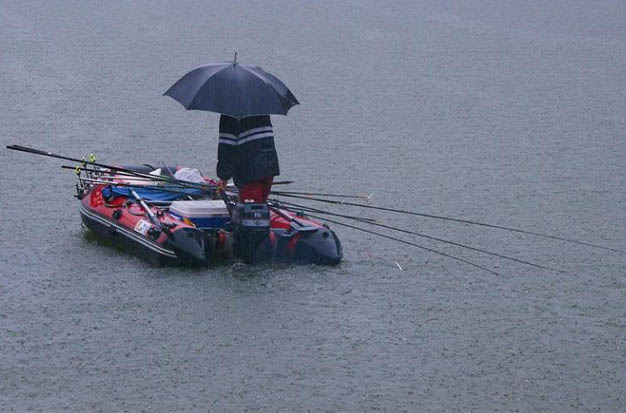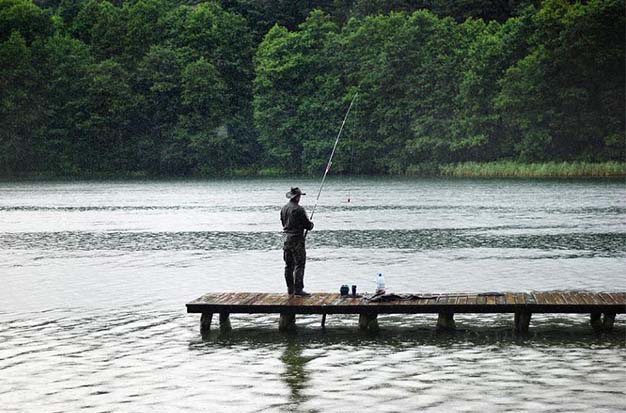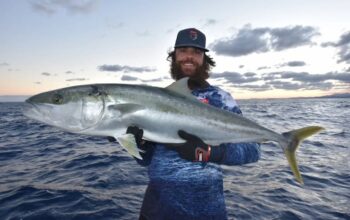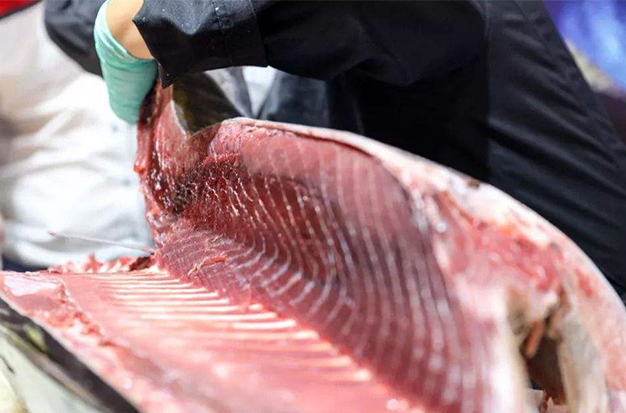You made the decision to go fishing and got everything ready as usual, but the weather changed. Because of this, most fishermen don’t even try to make it work in the rain because they find it to be so annoying. It may surprise you to learn that rainy days can be the best for fishing. It may also be excellent just before a downpour arrives. There are numerous tried-and-true methods and strategies for locating and catching fish in the rain.
I’ll discuss the best advice, concepts, and guiding principles for successful wet-weather fishing in this article.
Table of Contents
Is It Good To Fish In The Rain?
Rain can be very good for fishing, depending on the season.
Rain will typically not work in your favor in the early spring when the water is high and the temperatures are low. The best conditions for fishing will, however, be during the warmest months of the year, when water levels are lower. The same holds true for the period following very heavy rainfall (storms).
A very important point to make is that you should avoid fishing when there is a lot of lightning and thunder because it could be very dangerous for you.
Rain not only brings tiny worms and insects into the water, as was already mentioned, but it also stirs up a commotion among other tiny aquatic life. Fish are drawn to this occurrence to eat.Additionally, rain can cool, haze, and darken the water. Large fish are more mobile than usual under those circumstances.
It is advisable to use larger spinners on rainy days because they are easier to see without sunlight. Later on, we’ll discuss various strategies for various fish species.
Rain will make it darker and make fish more active in lakes with clear water, which is good for fishing. In contrast to rivers, lakes are vulnerable to an oxygen shortage during the warm, dry months of the year. Fish cannot see you and your fishing gear because rain cools the water, replenishes some of the oxygen, and reduces fish visibility.
Rain can make the water extremely muddy and “dense.” Rain can transport significant amounts of mud in addition to living things into water. It’s not ideal for fishing under those circumstances. Finding the clearest area away from obvious mudflows from riverbanks is advised in that scenario. If you aren’t using a boat, this issue is much worse.
If it has been raining for days before your fishing trip, you can anticipate this issue. By doing so, you can think about potential locations in advance and save your valuable fishing time for actual fishing.
Is It Better To Fish Before Or After It Rains?
Fishing is better before rainstorms if you ask me.
It’s good for fish activity when the atmospheric pressure drops before a storm. The best time for you to present your bait and catch a fish, or several, is when fish are in a feeding frenzy.
Fish activity will decrease during the storm, but that is not a problem because it is not advisable to fish in those circumstances. A very small window of time near the end of the storm occurs when pressure rises and fish are active. Fish will behave normally after the storm has passed or even become more inactive.
Fishing before the storm can be extremely beneficial in the summer and early fall. Additionally, thunderstorms that are extremely strong but short-lived are more frequent at that time of year. Bass is one of the fish that will respond most to changes in weather if you want to try and use them to your advantage.
If you’re not very good at predicting the weather, there are a ton of highly accurate and user-friendly websites and mobile apps available. A basic barometer can also be purchased and used while fishing if that’s what you’d prefer.

Five Tips For Fishing In The Rain
Get The Right Gear
You can stay reasonably dry in any precipitation if you have the right rain gear. Along with your torso, you’ll want to make sure that you shield your lower body. You can stay warm and dry with well-made, bibbed rain gear with cutting-edge technology.
The cold and stiff hands of an angler can make it difficult to handle gear. Your hands will stay dry and protected from the elements if you wear a great pair of fishing gloves that are both protective and moisture-wicking.
When rain is expected while you’re out fishing, be ready for anything.
Use Noisy, Vibrant Topwater Lures
Fish tend to gather near the surface in search of food, so many anglers advise using topwater lures when it’s raining. Others claim, however, that fish hang out just below the topwater, at a depth of about five feet, because the agitation on the water’s surface startles the fish.
Fish must discern the lure from the storm’s din during a downpour. Low visibility and loud rain hitting the surface are both present underwater. To ensure that the fish can see them, use loud, vibrant topwater lures.
Adapt To New Routines
Fish adapt to the weather by changing their usual behaviors. They may stage in various locations, move vertically in the water column, and even pursue various prey. Successful fishermen have been advised to adapt to the fish as they alter their routines.
Test out various presentations and lures until you find one that seems to be working. As the weather might alter as quickly as the fish’s preferences, you’ll need to move quickly.
Check Drainages And Creeks
Normally too shallow for fish to hunt, rain fills up popular offshore fishing spots. Runoff from drainages and creeks occurs when it rains heavily. Fish will eventually follow their prey because insects and larvae often follow into these new watercourses.
For fish, search recently flooded drainages and creeks. The easier it is to see what is hitting the lure, the greater the visibility. Try to locate the most open area with excellent visibility that is also shaded, in a sheltered cove, or far from the feeder streams.
Check The Water Temperature
The temperature of the water where you are fishing can change significantly after a rainstorm. Fish may feed closer to the surface during colder seasons if there has been warm precipitation.
Alternately, a cold rainstorm during the summer can encourage fish to move to lower depths. You can drop your lure into deeper areas of the lake, river, or ocean before or immediately after a downpour.
Conclusion
Fishing in the rain can be more successful than fishing on clear, sunny days. Rain has an effect on the majority of fish species. It’s almost certain that you will have one of your best fishing days if you use the right equipment and know where to go. Remember your safety as well, and stay away from thunder and lightning.
Fishing in the rain is very similar to fishing in the dry from a technical standpoint, but it is much more fruitful because of how the rain affects fish behavior. Fishing is one of the few activities that are better in rain, so during the summer and fall don’t hesitate when the forecast is “bad”.
Read more about: Do Fish Bite in the Rain?




